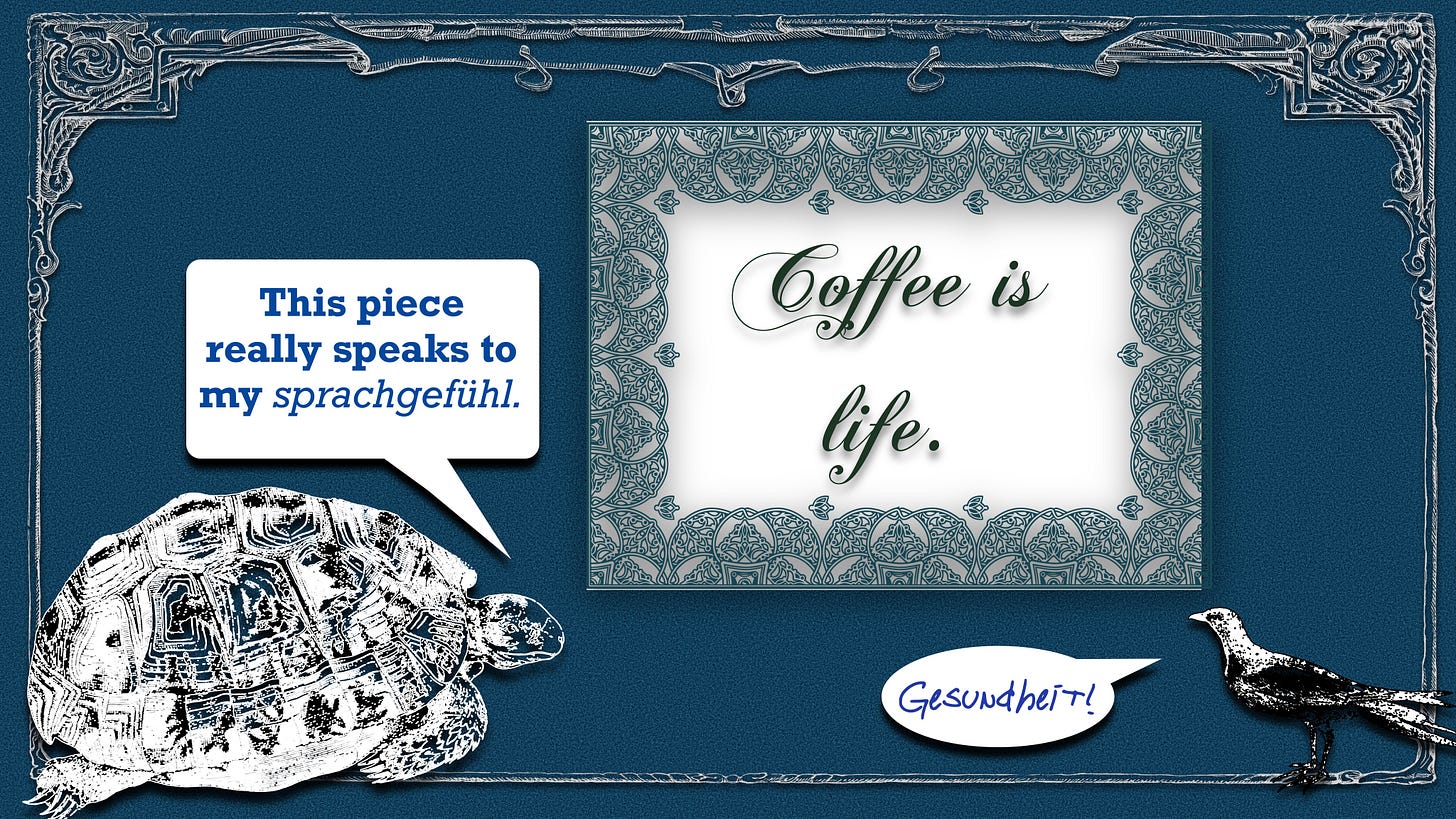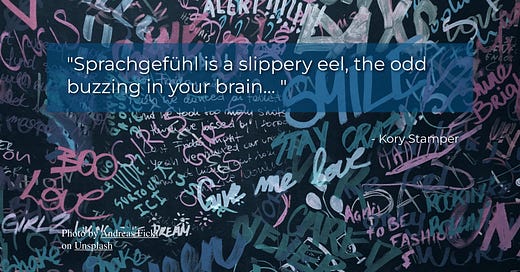This week: we go down the rabbit hole on one of the most unusual and most rare words we’ve ever seen. It’s a journey of love, loss, and redemption. Not really, but I do share some interesting research! Read on!
Sprachgefühl

This week's word is essentially a 700-word book recommendation. So, uh, get your wallets ready. Ready? Here's the word: Sprachgefühl.
And here's the book: Word by Word: The Secret Life of Dictionaries by Kory Stamper.
(NOTE: this link takes you to the Learned page on Bookshop.org, which means if you buy the book from this link - and you should - I'll get a tiny, fractional commission from the sale.)
And now some context: I spent the majority of last week at the LingComm 23 conference. It was a blast.
LingComm stands for linguistic communication; the conference is an occasion for academics and professionals to get together (virtually) and discuss methods, goals, projects, and everything else related to, well, communicating about linguistic topics to the general public. In other words, its a bunch of word-nerds sitting around talking about wordy word topics and how to infect others with the enthusiasm for wordy word topics. If you know the old adage about pigs and their happy place, yeah, that was me.
At one point, while waiting for a panel to start, someone raised the question, "What's everybody reading?" which may be my favorite ice-breaker question to ever have been asked. I said I was reading Word by Word. The reaction was immediate and sustained. Everybody loves Kory1. And they should. It's the rare memoir that manages to both be interesting and educational while also being funny throughout. And, as befits a book written by a lexicographer, it's full of weird and obscure words. Like Sprachgefühl.
Stamper uses sprachgefühl no less than 21 times throughout the book, starting on page 15, where she writes:
...to be a lexicographer. First and foremost, you must be possessed of something called "sprachgefühl," a German word we've stolen into English that means "a feeling for language."2
Which is not quite how Merriam-Webster defines it:
1: the character of a language
2: an intuitive sense of what is linguistically appropriate
It's an interesting distinction. Stamper's usage of sprachgefühl throughout Word by Word follows on from her definition. That definition and the second one listed in MW3 match up nicely and that makes a lot of sense; Kory Stamper works for Merriam-Webster4. It's that first definition's use of the indefinite article that throws me off.
Is this the idea that, to English-speaking ears, Italian sounds romantic and Cantonese sounds angry? The idea that French sounds laissez-faire5 and is anything but, while German sounds nihilistic and is not remotely so? I'm honestly not sure. So, I did a little more research and, well, I didn't find anything that helpful.

To get a fuller sense of how sprachgefühl is used and / or defined, I went to the corpora6. My first searches were not promising. Neither the COCA7 nor the BNC had the word listed either with or without the umlaut.
The NOW corpus was less than helpful. Not only did it have exactly one instances of the word being used, said usage is "her favorite word is sprachgefuhl." Note the lack of an umlaut.
The iWeb corpus similarly contains only a single instance of sprachegefuhl, but it is slightly more helpful. The reference comes from one Brownielocks.com, from their list of Bizarre, Odd, Outdated and Weird Words!8
Sprachgefuhl - A sensitivity to what is correct as far as a language is concerned. You have an ear for appropriate language.
But, while that is a helpful and useful definition, it didn't help me figure out what "the character of a language" is meant to mean. I opted for my last resort, Google Books.
Using Google Books Ngram search reveals that sprachgefühl had a peak usage in 1947, not to be surpassed until 2019. One can only assume this resurgence was caused by Stamper's book9. From there, I started looking at some of the earliest listed usages but came up with the same two phrases over and over:
the language instinct10
the feeling of language, e.g. the immediate perception of what is right and proper11
I suppose it's this second phrase that the dictionary is emulating, substitute feeling for character and it's nearly the same. But that indefinite article still gives me trouble. That, to me, suggests that sprachgefühl is not just my perception of language, but that each individual language has its own distinct sprachgefühl. And I like that idea. I'm just not sure if that's what they meant.
So, got a theory? A usage? A complete and total breakdown at the specificity of this topic? Get into the comments and let me know. And, in the meantime, grab a book or three and set your sprachgefühl to work.
Down the Rabbit Hole
The LingComm conference was held on the Gather platform and I am impressed. Gather lets you move a little 8-bit icon around the screen to simulate being a room and moving in person.
But the real genius is the seamless way your camera and mic come on and off to interact with whomever's around you, much as things might happen in the real world. It's the first technology I've used that comes close to one version of what I think the Metaverse might eventually be - a digital overlay on the real world.
It's worth taking a minute to go and look through the demonstrations and explanations because I'm convinced that, soon, when we all need to go online, a standard Zoom call will no longer be sufficient; we'll want to be in a digital space like Gather. Go try it out.
From the Archives
This week, we’re looking back at Learned, Volume Three, Issue 51: Vibe Pushback for no real reason other than it’s a good issue and I want more people to read it. So, uhm, please go read it?
I wouldn't normally refer to an author by their first name unless I had met them and / or knew them. But, apparently, judging by my own criteria, I was the only person in that room who was not on a first name basis with Ms. Stamper and thus, the usage of her first name here is to demonstrate her popularity. Kory, if you ever read this, I love your book.
She continues, "If you don't have sprachgefühl, it will become very apparent about six months into your tenure as a lexicographer. Don't be disappointed. This just means you can leave for a more lucrative job, like take-out deliver driver."
Helpfully, Merriam-Webster also notes that, "We're quite certain that the quality of sprachgefühl is common among our readers, but the word itself is rare, making only occasional appearances in our language."
I have no idea if she had anything to do with this definition.
See what I did there? Ah, yeah, I got jokes for days, baby!
Stamper writes, "Linguists love corpora; where two or three linguists are gathered, there shall you find heavy-breathing fetishism about the size, scope, all those possibilities, all that data." I feel personally attacked. The hell did I ever do to you, Kory?
Corpus of Contemporary American English and British National Corpus, respectively. They are large, well-documented and well-establish corpora often used for language research.
The webpage hasn't been updated since 2013, but it's a hell of a list!
Respect, yo. Game recognize game.
Reports Presented to Both Houses of Parliament by Command of Her Majesty, Volume 4, 1861
The American Journal of Education, Volume 4, 1857




